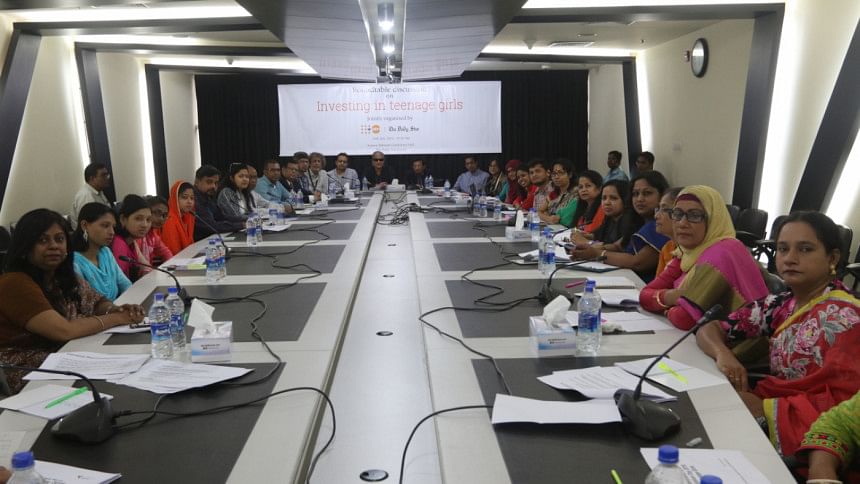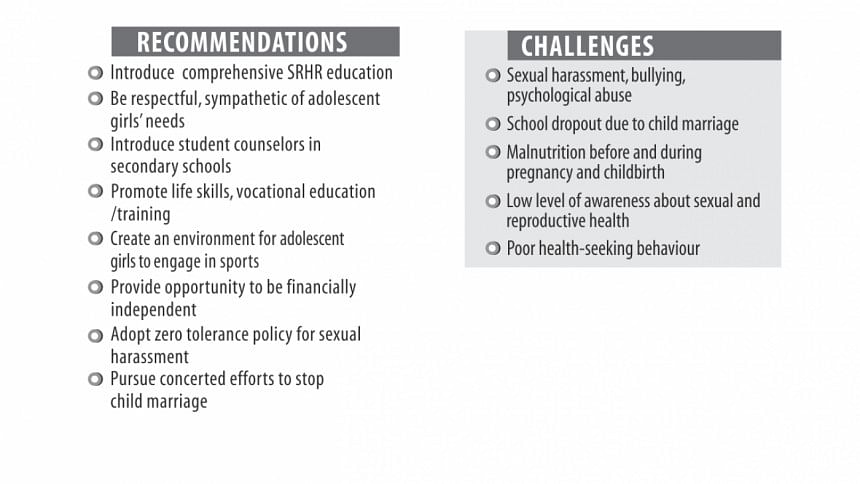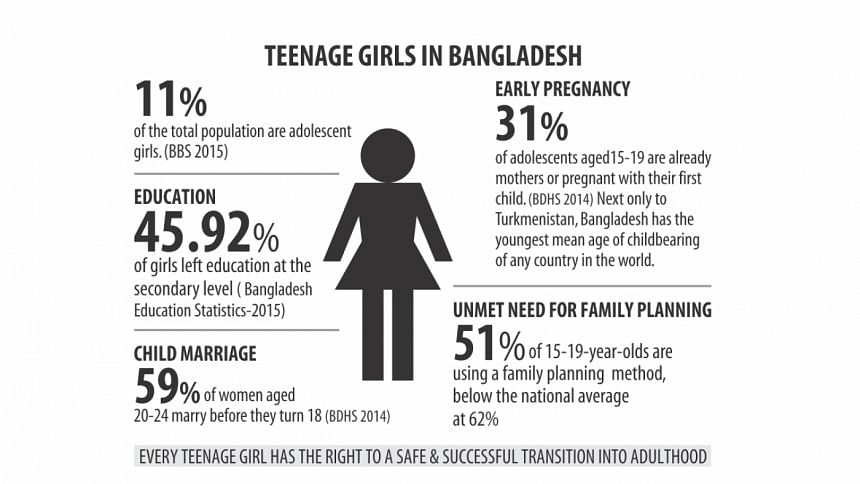Investing In Teenage Girls

An interactive and lively discussion looked into the issue of improving the lives of millions of teenage girls in Bangladesh. Eminent scholars, researchers, representatives from government, local NGOs, international NGOs, representatives from youth organisations and media and teenage girls attended a Roundtable organised by UNFPA and The Daily Star. They discussed the challenges faced by teenage girls and put forward valuable recommendations how to overcome these and bring about positive changes in the lives of girls. There was a strong consensus on the need to prioritize investment in teenage girls to enable their empowerment.
In Bangladesh, adolescents between the ages of 10 to 19 years account for 36 million or 22% of the total population. Of them, approximately 18 million are adolescent girls (BBS 2015).
Teenage girls belong to some of the most vulnerable population groups in the country. Major areas of concern, as brought forward by the participants at the discussion, concern their health, education and skills development and security and protection. Adolescent years are characterized by a period of physical and psychological changes, for girls and boys alike, as they transition into adulthood. Awareness about sexual and reproductive health among teenagers is still relatively low, and information and knowledge gathered is often not accurate, this in turn leads to very poor health seeking behavior among teenagers. A sense of shame and taboos further constrain teenagers' ability to access accurate information and sexual and reproductive health services.
The teenage girls participating in the roundtable discussion reported that it was difficult for them to discuss physical and psychological problems with parents and other family members. School teachers were also reluctant to discuss issues related to sexual and reproductive changes and health with their pupils. The discussants agreed that parents and teachers alike need to be encouraged to speak to teenagers more openly. There is a clear need for comprehensive sexuality education in Bangladesh as teenagers can only make informed decisions about their bodies and avoid risky behavior if they have accurate information. One of the participants suggested the introduction of student counselors in secondary schools.

Education
When discussing concrete measures to empower teenage girls in Bangladesh education was mentioned as one of the most important entry points. In Bangladesh, although enrollment of girl students is slightly higher than that of boys at the secondary level, their dropout rate still remains high, mainly caused by child marriage and subsequent dropout. While there are many primary schools at union level, the number of high schools and colleges is very low. As a result, girls have to travel a long distance to attend colleges. This was mentioned as one of the driving forces preventing girls from staying in school. Participants therefore urged the government to set up more educational institutions at the Upazila level. Moreover more girls should be encouraged and enabled to attend technical and vocational training schools, gain important life skills and become financially independent.
Child marriage
Child marriage was identified as the most menacing factors for a teenage girl in terms of her health, education and overall wellbeing. “We are often married off forcibly at early age,” said a teenage participant in the Roundtable. Early marriage is often followed by pregnancy with the teenage girl lacking both physical and mental maturity. The use of family planning methods also remains low among married adolescent girls. The BDHS Survey 2014 shows that about 31% of adolescents girls aged 15-19 are already mothers or pregnant with their first child. Early childbearing lengthens the reproductive period and subsequently increases health risks for the young mother and for the baby alike. Participants at the roundtable raised the question as to why the Child Marriage Restraint Act is so far not being properly implemented and stern actions are not taken against marriage registrars who do not comply with the law.
Gender based violence
Surveys have shown that levels of gender based violence in Bangladesh remain high. Close to daily reports in the media highlight that it is especially teenage girls who are at risk of physical and sexual violence and harassment, a reality which the teenage girls participating in the discussion sadly confirmed. The threat of violence and harassment impedes girls' education, participation in public life, and in some cases even employment. A zero tolerance policy for gender based violence should be adopted by the Government several of the participants suggested, whilst also ensuring justice is passed for all cases of abuse.

Nutrition
Although both boys and girls growing up and going through puberty require an increased intake of food it is most often boys who receive better and more food, often at the cost of teenage girls. As a result the affected girls can suffer from malnutrition with potentially severe effects on generations to come if the girl falls pregnant. Malnutrition of mothers has serious health consequences for babies. The discussants therefore suggested specialized policies to ensure proper nutrition of teenage girls.
Participants at the roundtable, did agree that despite the many challenges faced by adolescent girls their potential for positive change outweighed concerns. When teenage girls are provided with a respectful and supportive environment in family, society and state their options are manifold. The girls attending the discussion pledged their commitment to complete higher education and seek economic independence, as well as their commitment towards fighting child marriage. All participants expressed their gratitude for the organizers, UNFPA and The Daily Star and urged for increased participation of teenage girls in policy making forums.

 For all latest news, follow The Daily Star's Google News channel.
For all latest news, follow The Daily Star's Google News channel. 



Comments